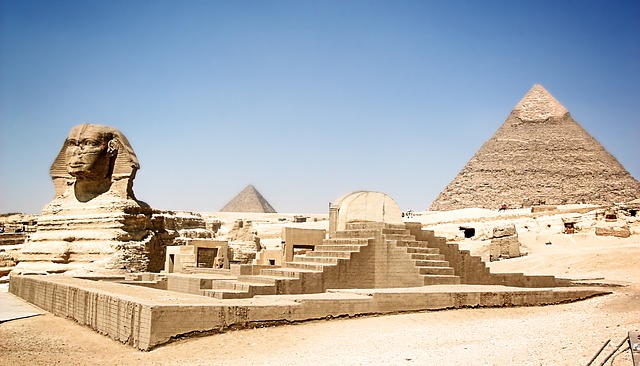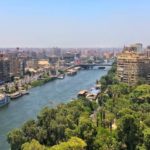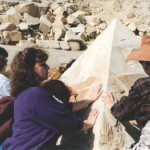How the Egyptian People Got Me to Do the Impossible

Breathe. Just breathe.
I gripped the wooden rail, my knuckles drained of all color, as I stared down into the musty abyss of darkness below. The smell of dust and stale air permeated my nostrils, wafting up the steep shaft of the centuries-old burial chamber. Paralysis had snaked its way into my arms and legs, making them as heavy as a block of limestone.
I was three feet into the entrance of the pyramid of Teti—located near the Step Pyramid of Djoser in Saqqara, Egypt—and all I could think about was the weight of the stones collapsing and burying me alive. I desperately wanted to turn around and march right back up. March into the wide-open space surrounding the pyramid complex, the sweet taste of fresh air on my lips. Except there was one small problem: with a steady stream of tourists and locals clambering up and down both sides of the narrow passage, it would be impossible to step out of my place in line.
True, our tour guide had warned us about this. “Once you go in, there’s no turning back; you have to keep moving,” she had gently reminded us before we set foot inside. I silently cursed myself for believing that my claustrophobia wouldn’t be an issue as I attempted to wedge my way down into the bowels of the pyramid.
I silently cursed myself for believing that my claustrophobia wouldn’t be an issue as I attempted to wedge my way down into the bowels of the pyramid.
In fact, I could sense the growing impatience of others behind me as they waited their turn to continue down to the internal chambers. A teenage boy about three people behind me whined, “Mom, what’s the hold up? Why aren’t we moving?” I’m no female Indiana Jones, I chastised myself, cringing at my increasingly rapid breathing and sweaty palms. Why today, of all days, had I decided that I wanted to be brave?
**
Egypt. Say the word today, and many will think of the recent revolution and its aftermath. For me, however, the mention of the word “Egypt” had always conjured up dreamily constructed images of pyramids, Nefertiti, and jackal-headed gods. As a history major in college with a focus on ancient civilizations, it was a dream come true when I visited Egypt. It was part of a 12-night Mediterranean cruise in July 2009.
While it was this ancient version of Egypt that initially drew me to its doors, it was modern Egypt that I grew to understand and appreciate on that sweltering summer day. Our ship docked in Alexandria at dawn, followed by a two-and-half-hour bus ride to Cairo in the early light of day. I was struck by the measures taken to ensure our safety; the highway was shut down for our tour bus, and we had armed military guards with us at all times.
While it was this ancient version of Egypt that initially drew me to its doors, it was modern Egypt that I grew to understand and appreciate on that sweltering summer day.
Despite this protection, and the admittedly sheltered version of the country we were seeing as we were herded from landmark to landmark, we still saw glimpses of the realities of life in a developing country. Although this may be nothing new to seasoned travelers, it was my first such experience at the time. Piles of garbage overflowed into a river as flies lazily hopped from plastic bags to rotting fruit. Several buildings had rooftops that remained half-finished, making them appear dilapidated and hazardous. This was for tax purposes, we later found out; top floors were frequently left incomplete to avoid the higher taxes on finished buildings.
Throughout the day, our tour guide regaled us with stories and insights into Egypt’s past and present. I was surprised when our tour guide told us that those in her profession were the equivalent of the upper-middle class in Egyptian society. Whereas teachers, lawyers, and doctors were considered lower-middle class. She also shared that 40% of the population lived below the poverty line, earning 100 USD per month at the time.
Perhaps the greatest lesson I learned that day, however, was not related to facts or figures. It was about the warmth of the Egyptian people.
Here’s how the Egyptian people got me to do the impossible.
**
I had resolved to be brave today—of all days—because my desire to experience Egypt to its fullest had initially outweighed my intense trepidation while inside small spaces. As the physical reality of my situation inside the pyramid’s passageway became more apparent, however, I felt myself retreating into the cavern of my mind. Unable to move or to speak. Two eternal, excruciating minutes. In all likelihood, this was the actual amount of time that passed before I heard someone say softly, “You can do it!”
I tilted my head to the side, surprised to see two female Egyptian tour guides about five feet below me. She was holding up traffic going up the other way. They couldn’t have been more than 40 years old. They were dressed in jeans, white cotton blouses, and headscarves of fuchsia and coral. Their kind eyes took me in, a lost girl needing one final push to be brave.
In that moment, I was touched that these women had put the needs of one complete stranger above the many. As they continued to offer words of encouragement to me, others around them joined in. The collective chants of positivity propelled me to reach the large chamber below.
As the physical reality of my situation inside the pyramid’s passageway became more apparent, however, I felt myself retreating into the cavern of my mind. Unable to move or to speak.
Once there, I triumphantly turned around. “Thank you!” I shouted up to the women. But they were gone.
Years later, on a trip to the baths at Virgin Gorda in the British Virgin Islands, I found the roles reversed. My mother clenched the frayed rope attached to the rock formation’s wall. Petrified and immobile, unsure if she could climb past the jagged rocks. “You can do it,” I called out softly, guiding her to the ledge of the next tide pool.
As the Egyptians had taught me, we all have an untapped reservoir of courage. Sometimes, we just need a little help from a friend.
How Egyptian People Got Me to Do the Impossible Related Reading
6 Things to Know Before Your Egypt Trip
Have you traveled to Egypt? How was your trip? Email us at [email protected] for information about sharing your experience and advice with the Pink Pangea community. We can’t wait to hear from you.
How Egyptian People Got Me to Do the Impossible photo credits by Pixabay.









A great read and your emotional journey was very detailed.
Thanks, Tiffany! Looking forward to reading about your travels one day, to Montreal and beyond!
As a fellow claustrophobic, I could almost feel my heart racing and my own palms sweating as I thought back to my adventure in the dark and narrow passages of a cave well hidden in the Rocky Mountains.
I too could feel the weight of the rock above me and cursed myself for thinking I would just buck up, face my fears, and go for it. As the crowd behind us continued to drive and push me deeper I too went deeper inside myself to get through an emotional difficult time.
Even though my mind and body had suffered terribly through the whole adventure…I did get to see incredible wonders that nature had kept to herself for many long years.
Cseeszka, thanks for sharing your story! I admire your bravery in the Rocky Mountains. Glad to see another kindred spirit out there!